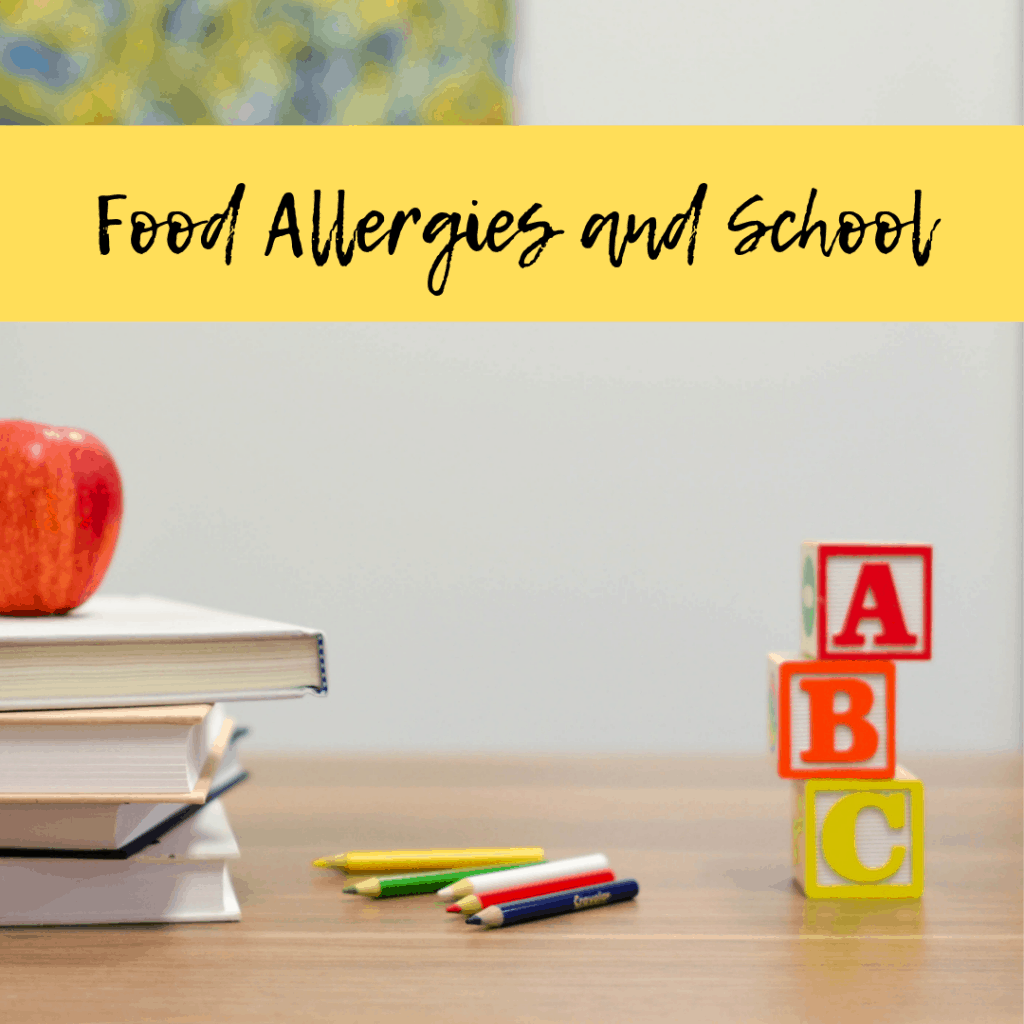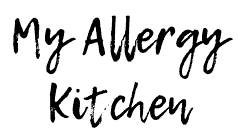My youngest daughter, E, is coming to the end of her Reception year (the first year of school in the UK), so I thought I would share our experiences of starting school with food allergies. She has non-IgE food allergies (delayed reactions - usually) to milk and soya. Thankfully, she is halfway up the milk ladder, so she can tolerate cooked foods containing milk. She still has to avoid any uncooked dairy foods such as cheese, yogurt, cream, ice cream etc and of course milk itself. She is very sensitive to soya and cannot even tolerate soya lecithin. A reaction can make her poorly for about a week, so it's something we really want to avoid, but our experience will of course be very different from someone who is at risk of anaphylaxis.
Check out my top tops for starting school with food allergies.

Choosing a School
My older daughter, K, was already at primary school. Luckily I already had a good relationship with the school. K has food intolerances herself. She's had to do exclusion diets whilst at school and thankfully the school have been very supportive.
The headteacher prides herself on running an inclusive school. There are a few children in the school with special dietary needs - allergies, intolerances, coeliac disease, and religious diets too. So all the teachers keep Haribos (suitable for most kids) on standby for any special occasions, meaning no one is left out. Plus, it's a nut-free school, as there is someone with a nut allergy, so they do have some awareness of food allergies already.
Last summer, to celebrate the World Cup the school held a special day where the children tasted food from different countries around the world. They planned it well and had already made provision for the kids with allergies and intolerances. I was really impressed!
Overall, I felt confident that the school would be able to manage my daughter's allergies effectively.
Home Visit
When your child starts in Reception the teacher may visit you and your child at home. This is a chance for them to see the child in their home environment and get to know you both a bit better. It's a perfect opportunity for you to bring up food allergies and discuss any questions or concerns.
We were very lucky as I already knew E's Reception teacher really well. Her daughter was at preschool and school with K and they have had playdates together a few times. Plus she worked in K's class last year, so she was already aware that we have issues with food in our family.
At our home visit I brought up E's allergies and mentioned my specific concerns around school. Thankfully, as E's allergies are non-IgE, she only reacts if she eats the food. But I did have a couple of worries. Firstly, in Reception children get free milk every day until they turn 5. I was worried about spills and the social aspect of being left out. Plus I was worried about children sharing food at lunchtimes, cooking in class, and special occasions such as birthdays and Christmas parties.
Preparing Your Food Allergy Child for School
It's absolutely essential that you teach your child about their food allergies before they start school. Ideally start from a very young age. If they know what they can't eat, they can speak up for themselves. Because the reality is, people do make mistakes. We have to accept that, and prepare for it. The teacher is responsible for so many children, and food allergies are easy to forget because they are invisible.
Over the summer I discussed with E about 'milk time' at school. This was a difficult conversation to have as I always try to speak positively about school. But I needed her to know what she would be dealing with. I also wanted to know how she preferred to handle it. I offered to bring in some small cartons of her dairy free milk to drink, but she decided she would rather have water. We had conversations about this a few times over the summer break to prepare her.
Day one at school proved how important this was. At milk time, E was offered a carton of milk along with all her classmates. Whether the teacher just did it automatically, or if it was a different member of staff who wasn't aware of E's allergies, I don't know. Thankfully, E told the teacher 'No, I can't have milk' and she had her drink of water instead. All our preparations paid off!
I was really proud of her for doing this as she was very nervous about starting school and didn't really speak to anyone for the first couple of weeks, so it really could have had a very different outcome. Needless to say, I was also furious with the school for putting her in this position. However, the teacher actually came and spoke to me about E's allergies the following morning, which put my mind at rest, and it has never happened again.
Write a Letter to the Teacher
On the first day of school I wrote a letter to the teacher spelling out exactly what we had discussed at the home visit. I did this firstly as a reminder, as several months had passed since that conversation. Secondly, did you know that people take things in writing more seriously? Plus, it's something for members of staff to refer to if needed. I also sent a copy to the headteacher, and she circulated it to all the staff in the school.
In the staff room, they keep photos of all the children with medical conditions. The secretary set it up, and asked me to double check. It was wrong (for both of my children!) It was also wrong on their computer system. Why do so many people think 'food allergies' means 'gluten free'? I tried my best to laugh it off and be forgiving. I reminded myself that it was an opportunity to teach her. No actual harm was done. If I can help the school learn about food allergies, then they'll be better prepared when someone comes along with a really severe allergy.
School Dinners vs Packed Lunches
To be perfectly honest, I was rather surprised that school dinners were even an option for us. When E was a baby she had 6 food allergies (milk, soya, wheat, eggs, oats and legumes) and I thought I would be making her packed lunches for ever!
Our school has outside catering, and can offer us 'suitable' food. It is 'safe' but they don't offer any substitutes for anything. There's no flexibility - she has to be completely milk free, even though she can now tolerate cooked dairy. If she can't have the main course, they just offer jacket potato. If she can't have the dessert, she just gets fruit. There's no provision for calcium on a dairy free diet.
The first day of school dinners was a real challenge for me as a mum. It was the first time I wasn't in control of what my daughter was eating. I found it really difficult to trust someone else to be as vigilant around food as I've been. The dessert that day came with cream. In my mind I pictured the dinner lady giving her the dessert without thinking ... and E eating it because she didn't want to get told off ... WHO KNOWS what would happen then??? She's never eaten even a drop of cream so I have literally no idea how she would react. I was so worried about it that I actually burst into tears when I dropped her off that morning.
Luckily everything was fine. For me it was a sudden realisation of how uptight I was about food! I've had to be so careful over the past few years. My daughter really suffered for a long time before we got our allergy diagnosis, and I am really afraid of rocking the boat and ending up back in that situation again. It feels unsafe to let go of that control.
Communication
Communication has been an ongoing issue. Finding out what school dinners E could have was a challenge - it took several weeks for the catering firm to send us a personalised menu. I guess E was the first child in the area with a soya allergy. And each term we have to wait a couple of weeks before we know which meals she can have each day.
We also had an issue where the dinner lady gave my daughter the 'wrong' meal one day. Her menu specified pasta that day, but she actually had sausages. I flew into a panic, as I'd been told the sausages had soya in. She then had an upset stomach that evening. I spoke to school about it and eventually had a meeting with the manager from the catering company. Fortunately it turned out to be just a breakdown of communication, and the upset stomach was a coincidence. The office hadn't given the dinner lady a copy of E's special menu, and she had just phoned through to check the ingredients in the food. So she had done the right thing, and the food was safe, but it wasn't what we were expecting. At the time it was rather stressful, but thankfully no harm done.
After speaking to school about this, they have put a second check in place. So the class teacher will double check that E gets the right meal. However, in the end we have settled on Fridays only for school dinners. They always have fish on a Friday, and E can have the same meal as everyone else. This means less chance of a mix-up. There are other meals that she could have, but she doesn't like all of them, and to be honest my nerves can't take it!
Special Occasions
We are lucky that the school does usually think ahead about including children with food allergies in special occasions. As I mentioned, they always have safe sweets on standby for birthdays - most parents actually bring in sweets now and not cakes anyway. [When did this thing of bringing in food for birthdays start??? It didn't happen when I was little! Allergies aside, I thought schools were meant to promote healthy eating?]
Every year at Christmas, each class has its own party. The children with special dietary requirements take in their own 'party plate' of food, wrapped in clingfilm and labelled with their name. The teacher gives them this plate to eat at the party. This worked really well for us as it was simple and straightforward. My daughter is well used to only eating her own food at parties so it was no bother for her.
There are also PTA events but those always have superb provision for children with allergies. I would hope so anyway as I'm the Chair!!! At the Christmas fair we make sure Santa brings non-food gifts for the grotto. For our Easter Trail there were suitable sweets on offer as an alternative prize instead of a small chocolate egg. When we have cake sales I always make something gluten free and vegan and label it - hopefully that covers most people!
Food Allergies and School
Overall, our experience of starting school with food allergies has been positive. We have had a couple of teething problems along the way. Communication has been an issue at times. People do find a soya allergy a bit confusing, I guess because it is less common. I have found it really stressful at times - it is so hard as an allergy parent to let go of control and trust others to remember. However, we have got through the first year of school without any actual reactions (so far at least), so for that I am truly thankful.


Leave a Reply